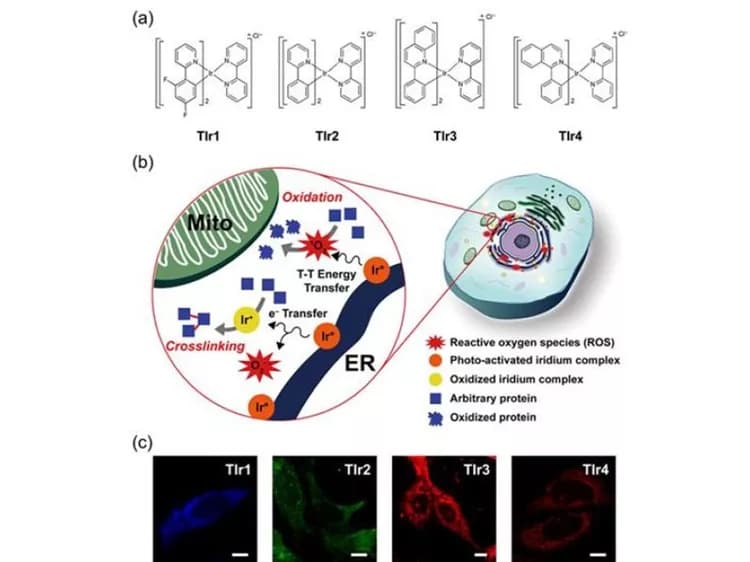
Groundbreaking Study Sheds Light On Treating Cancer
The work by Prof. Tae-Hyuk Kwon (School of Natural Science) at Ulsan National Institute of Science and Technology (UNIST), South Korea has presented a new cancer treatment that uses red lights to target and kill cancer cells alternatively without surgery.
The new study, by researchers from UNIST demonstrates a more holistic light-based treatment to nuke cancer cells instead of surgery. The results, reported in the September issue of the Journal of the American Chemical Society (JACS), could open up new avenues of research in cancer treatment.
This research has been jointly conducted by Prof. Tae-Hyuk Kwon (School Natural Science), Prof. Mi Hee Lim (School of Natural Science), and Prof. Hyun-Woo Rhee (School of Natural Science), and eight other researchers at UNIST.
The study focuses on Iridium(III) complexes as promising novel agents for photodynamic therapy (PDT), a treatment that selectively wipes out cancerous cells without harming surrounding tissue.
It also provides a careful analysis of reactive oxygen species (ROS) production process, as well as the therapeutic effects of specific wavelengths of different colors of light on cancer cells. It turns out that these Iridium(III)-based materials that utilize red lights attack the cancer cells more effectively and eventually lead to the cell death.
The PDT uses special drugs, called photosensitizers (PSs) in combination with harmless visible light to kill cancer cells. Upon activation by light, a PS produces a form of oxygen that display selective cancer cell killing behaviors. However, to date, the detailed mechanisms and direct involvement in PDT have not been revealed clearly.
In the study, Prof. Kwon and his colleagues developed a number of PSs for PDT. The results show that red-light-absorbing PSs with longer wavelengths significantly accelerated ROS production compared to blue and green lights of shorter wavelengths.
Jung Seung Nam (Combined M.S./Ph.D. student of Nature Science, UNIST), the first author of the study states, "These newly-developed Iridium(III) complexes not only induce enhanced production of ROS, but they are also effective at killing cancer cells." He adds, "Using infrared light that penetrate deep into the human body, we are now capable of killing deep cancer tumors without damaging healthy tissue."
To further understand the exact mechanism of apoptotic cell death, the research team characterized the modes of action for Iridium(III) complexes for both protein cross-linking and protein oxidation, using mass spectrometry (MS).
They report that "In living cells, the damage was predominantly found in proteins near the endoplasmic reticulum (ER) and mitochondria with significant association to cell death pathways. Therefore, these Iridium(III) complexes efficiently functioned as PDT agents in cancer cells."
The team expects that their Iridium(III) complexes could be used for additive-free photo-cross-linking in other fields beyond PDT. With further research, this novel agents could conceivably used to treat a wide range of human cancers, researchers say. This study has been supported by the UNIST Alzheimer's Disease research fund.
Materials provided by Ulsan National Institute of Science and Technology (UNIST). Note: Content may be edited for style and length.
Disclaimer: DoveMed is not responsible for the adapted accuracy of news releases posted to DoveMed by contributing universities and institutions.
Primary Resource:
Nam, J. S., Kang, M. G., Kang, J., Park, S. Y., Lee, S. J. C., Kim, H. T., ... & Kwon, T. H. (2016). Endoplasmic Reticulum-Localized Iridium (III) Complexes as Efficient Photodynamic Therapy Agents via Protein Modifications. Journal of the American Chemical Society, 138(34), 10968-10977.
Related Articles
Test Your Knowledge
Asked by users
Related Centers
Related Specialties
Related Physicians
Related Procedures
Related Resources
Join DoveHubs
and connect with fellow professionals

0 Comments
Please log in to post a comment.